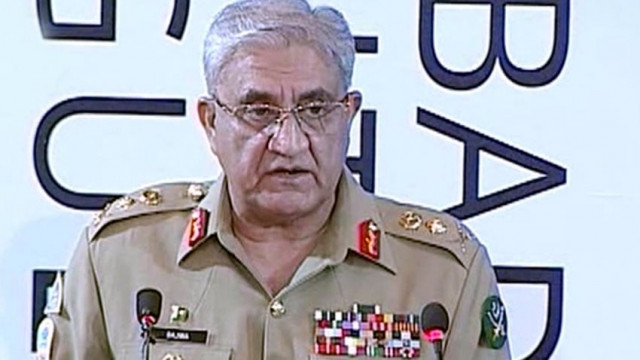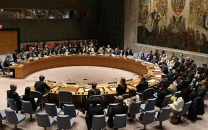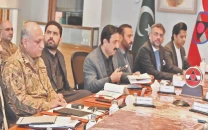No good can be expected from outside until we put own house in order: COAS
Pakistan resisted temptation to compete in arms race despite rising security challenges, says Gen Qamar

“Unless our own house is in order, nothing good could be expected from outside,” Army chief General Qamar Javed Bajwa said while speaking at the first-ever Islamabad Security Dialogue on Thursday.
The army chief said Pakistan has tremendous geo-economic potential. “In order to carve a promising future for our people, it is important for us to embark upon a solid economic roadmap, backed up by infrastructural developments and regional integration,” he added.
Gen Bajwa said that Pakistan’s geo-economic vision is centred around four core pillars: 1) moving towards a lasting and enduring peace within and outside; 2) non-interference of any kind in the internal affairs of our neighbouring and regional countries; 3) boosting intra-regional trade and connectivity; and 4.) bringing sustainable development and prosperity through establishment of investment and economic hubs within the region.
“Pakistan has been working towards all four aspects with unity of purpose and synchronisation within the various components of national security,” he added. “We had realised that unless our own house is in order, nothing good could be expected from outside.”
The army chief said that after stemming the tide of terrorism Pakistan has started working towards sustainable development and improving economic conditions of the underdeveloped areas.
“Pakistan Army has contributed tremendously towards this national cause by rebuilding and mainstreaming some of the most neglected areas through massive development drives besides ensuring peace and security,” he added.
“Our long campaign against the tide of terrorism and extremism manifests our resolve and national will. We have come long way and yet we are a bit short of our final objective but we are determined to stay the course.”
#Live: Army Chief General Qamar Javed Bajwa addressing Islamabad Security Dialogue’ conference in Islamabad @OfficialDGISPR https://t.co/Q6XHeB27TP
— Radio Pakistan (@RadioPakistan) March 18, 2021
Pakistan India ties
On relation with the western neighbour which has traditionally defined Pakistan’s security policy, the army chief said stable Indo-Pak relation was a key to unlocking the untapped potential of South and Central Asia by ensuring connectivity between East and West Asia.
“This potential, however, has forever remained hostage to disputes and issues between two nuclear neighbours. Kashmir dispute is obviously at the head of this problem,” he added. “It is important to understand that without the resolution of Kashmir dispute through peaceful means, process of subcontinental rapprochement will always remain susceptible to derailment due to politically motivated bellicosity.”
However, we feel that it is time to bury the past and move forward. But for resumption of peace process or meaningful dialogue, our neighbour will have to create conducive environment, particularly in Indian Illegally Occupied Jammu and Kashmir.
Gen Bajwa told the participants that a responsible and mature behaviour of Pakistan in crisis situation with India manifested the country’s desire to change the narrative of geo-political contestation into geo-economic integration.
On other countries in Pakistan’s neighbourhood, the COAS highlighted Islamabad’s robust role in the current quest for sustained peace process in Afghanistan. He told the participants that Pakistan has invited Afghan to join China-Pakistan Economic Corridor (CPEC) and allowing Afghan exports to India.
He also highlighted Pakistan’s efforts aimed at reviving the South Asian Association for Regional Cooperation (Saarc). He said that an economically interconnected South Asia would be much more suited to the world rather than a war-torn, crisis-ridden and destabilised region.
Read more: PM launches advisory portal on national security
“We also see a hope in the form of incoming US administration [of President Joe Biden], which can transform the traditional contestation into a gainful economic win-win for the world in general and the region in particular. South Asia can be the starting point for regional cooperation.”
“Pakistan Army has contributed tremendously towards the national cause by rebuilding and mainstreaming some of the most neglected areas through massive development drives, besides ensuring peace and security,” he added.
“Our long campaign against the tide of terrorism and extremism manifests our resolve and national will. We have come long way and yet we are a bit short of our final objective but we are determined to stay the course.”
In order to carve a promising future for the people, the army chief emphasised the important of embarking upon a solid economic roadmap, backed by infrastructural developments and regional integration.
Gen Bajwa believed that no single nation in isolation, could further its quest for security, because every single issue and security dilemma was intimately linked with global and regional dynamics and responding to them in “silos is no longer an option”.
Overall, the army chief emphasised, that developing countries like Pakistan, faced multi-dimensional challenges, which could not be navigated single-handedly. He added that similar situation was confronted by other countries in the region, which required a multilateral global and regional approach.
Meanwhile, Foreign Minister Shah Mahmood Qureshi said while resolving to protect its vital national security interests, Pakistan was shifting its emphasis from geo-politics to geo-economics besides calling for preferring cooperation over confrontation.
The foreign minister, in his keynote speech at Islamabad Dialogue, said the enhanced trade, investment, energy security, tourism, and people-to-people exchanges were Pakistan's higher priorities.
"Our primary interest is in sustaining a peaceful, stable and prosperous world order, that takes everyone on board and leaves no one behind. We call for shedding zero-sum perspectives, and for preferring cooperation over confrontation," he said in his address at the third session of the high-level event.
He reiterated that Pakistan would remain committed to peaceful co-existence, cooperative multilateralism, and win-win outcomes besides supporting a rules-based and inclusive global order, for advancing the shared objectives of peace, progress and prosperity.
He told the audience that the world was going through a profound transformation as new security partnerships were being forged and old alliances being further fortified.



















COMMENTS
Comments are moderated and generally will be posted if they are on-topic and not abusive.
For more information, please see our Comments FAQ